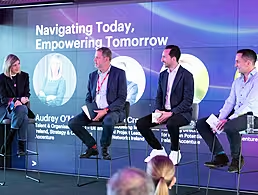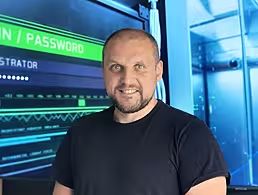Accenture data engineering manager Piyusha Saboo shares her productivity tips and explains why she loves using Post-it notes so much.
Within the tech world alone, there are a multitude of engineering roles available to those with the right skills and mindset.
As part of Engineers Week, we looked at 24 companies that are currently hiring for a wide range of engineers right now, including professional services firm Accenture.
Piyusha Saboo is a data engineering manager for the company, having worked her way up from a data engineering consultant. She gives us an insight into what a career in her field is really like.
‘Something I cherish is when your engineering project is live and running successfully’
– PIYUSHA SABOO
If there is such a thing, can you describe a typical day in the job?
Typically, my day starts around 8:30am with a coffee in my hand as I check my emails and messages before I dive into client work. This is followed by a daily stand-up call where I speak with my teammates about progress, blockers and actions.
Most of the time, I have client and team meetings lined up throughout the day. Some days/weeks can be exceptionally busy, so I manage them by carefully reshuffling my tasks based on priorities.
The resources I find extremely useful for this are One Note, Microsoft Teams, any Kanban board and good old Post-its – my wall is usually filled with neon colours!
What types of engineering projects do you work on?
I have been part of many engineering projects in Accenture, primarily on the data management side. This has included some regulatory reporting programmes in the financial services sector.
I particularly enjoyed working on a GDPR compliance project. Data privacy is something I value a lot, and through this work I was able to learn how to balance an individual’s privacy with regular business processes, as you don’t want one to negatively impact the other.
Most recently I started working on a cloud analytics platform set-up for a bank – again something I have been enjoying tremendously as it’s a steep learning curve with the latest tools and tech stack.
What engineering skills do you use on a daily basis?
One of the most important things that engineering has taught me is anticipating the potential issues and finding an array of solutions to tackle them.
I am often managing the engineering teams for different platforms and technologies such as data warehouses, cloud platforms, data lakes etc.
So, the problems and solutions are different each time. Every time I find myself in a new tricky, puzzling situation, I love to draw myself out of it by applying a problem-solving and strategic-thinking mindset.
What are the hardest parts of engineering, and how do you navigate them?
The hardest part is managing how to effectively start and stop working, especially when working from home. I used to check my emails at odd hours, so I had to take a decision to turn off those pesky notifications.
Humour aside, the hardest part of my role is often agreeing the right requirements between the client and the Accenture engineering teams and getting that appropriately channeled and documented.
It’s crucial to set the right expectations at the beginning, with a clear list of actions and a plan for achieving them. It’s key to plan for contingencies as well – more strategic planning equals better outcomes!
Do you have any productivity tips that help you through the day?
Plan ahead! It’s really important for my own productivity and I always encourage my team to plan their time in advance too. Nowadays, many organisations use agile methodologies, which is really helpful as it gives you that chance to divide and plan your work.
For me personally, writing down what I need to achieve also helps, plus the feeling of crumpling the Post-its when finished is rewarding!
Also, make sure to schedule your breaks, be it a coffee or tea break, a scroll on Instagram or a quick walk. Take those 10-15 minutes to boost your productivity for the rest of the day.
What skills and tools are you using to communicate daily with your colleagues?
At Accenture we work with the amazing Microsoft suite. Microsoft Teams has it all – calls, chat, file sharing and countless add-ons. This can change for different clients, as we often work on their infrastructure, so I have used Skype and WebEx as well.
The key with remote communication is bonding and networking. Something as simple as turning on the camera and speaking about something other than work for the first five minutes helps establish healthy working relationships.
I’m hoping to get more in-person team sessions over coffee though – I have missed being able to stand-up and head to the conference room.
LinkedIn and Medium are my other work-social platforms to stay updated with industry trends.
How has this role changed as the engineering sector has grown and evolved?
It’s different every day! An engineering manager role has transitioned from status reporting and people management to a servant-leadership role where I need to be involved with daily tasks with the team enabling them to achieve our planned goals.
Our clients have different expectations now also. They want their data platforms to be implemented with the latest tech stack and low-maintenance cloud platforms with a cost-effective solution.
It’s an amazing time as we’re constantly on our toes learning new skills and un-learning the old ways of working.
What do you enjoy most about working as an engineer?
Something I cherish is when your engineering project is live and running successfully. That’s the greatest satisfaction for the months you have poured into a project.
Also, I have had great client stakeholders who are just as happy (if not happier than I am!) when the project is a success.
What advice would you give to someone who wants to work in engineering?
Never stop learning and exploring. I know there’s vast amount of knowledge out there with something new emerging in the market every day but take one step at a time and learn one thing at a time. It’s important to have the concepts clearly understood rather than a vendor or a tool name.
Don’t miss out on the knowledge you need to succeed. Sign up for the Daily Brief, Silicon Republic’s digest of need-to-know sci-tech news.




